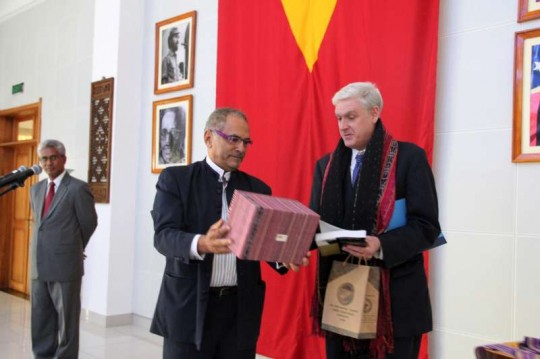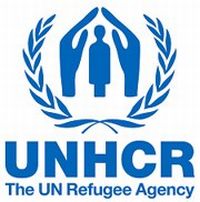Concluding its work, UN refugee agency closes office in Timor-Leste
Concluding its work, UN refugee agency closes office in Timor-Leste

President José Ramos-Horta of Timor-Leste (left), presents gifts to UNHCR’s James Lynch at a ceremony marking the closure of the refugee agency’s office in Dili. Photo: UNHCR/K.McKinsey
The United Nations refugee agency has closed its office in the Timor-Leste capital, Dili, after more than 12 years, a move hailed by national leaders as a sign that the country had overcome most of the humanitarian problems it has faced in its recent history.
President José Ramos-Horta convened a gathering at the presidential palace yesterday to mark the closure of the office of the UN High Commissioner for Refugees (UNHCR) and pledged that his country will never turn its back on refugees because so many of his compatriots were exiles themselves.
“We are always ready to live up to our responsibilities,” he said. “That’s the best way to thank UNHCR and all the countries that all these years have assisted our refugees.”
Mr. Ramos-Horta himself spent more than two decades as a refugee in the United States and Australia between 1975 and 1999.
UNHCR opened the office in Dili in May 1999, just before the violent referendum on independence from Indonesia that sent nearly a quarter of a million people fleeing across the island into West Timor.
UNHCR helped 220,000 refugees return home and worked for reconciliation as Timor-Leste moved towards independence in May 2002.
James Lynch, UNHCR’s regional coordinator for South-east Asia, praised the country’s “impressive achievements,” pointing out that Timor-Leste was one of the few countries in the region to have signed the 1951 UN Refugee Convention.
“Even though right now it has almost no refugees or asylum-seekers, it does have national laws in effect to process their claims,” he said.
###
About the Office of the United Nations High Commissioner for Refugees (UNHCR)

The Office of the United Nations High Commissioner for Refugees was established on December 14, 1950 by the United Nations General Assembly. The agency is mandated to lead and co-ordinate international action to protect refugees and resolve refugee problems worldwide. Its primary purpose is to safeguard the rights and well-being of refugees. It strives to ensure that everyone can exercise the right to seek asylum and find safe refuge in another State, with the option to return home voluntarily, integrate locally or to resettle in a third country. It also has a mandate to help stateless people.
In more than six decades, the agency has helped tens of millions of people restart their lives.
Today, a staff of some 7,685 people in more than 125 countries continues to help some 33.9 million persons.
###
> United Nations (UN).
 The United Nations was established on 24 October 1945 by 51 countries committed to preserving peace through international cooperation and collective security. Today, nearly every nation in the world belongs to the UN: membership totals 192 countries.
The United Nations was established on 24 October 1945 by 51 countries committed to preserving peace through international cooperation and collective security. Today, nearly every nation in the world belongs to the UN: membership totals 192 countries.
When States become Members of the United Nations, they agree to accept the obligations of the UN Charter, an international treaty that sets out basic principles of international relations. According to the Charter, the UN has four purposes:
- to maintain international peace and security;
- to develop friendly relations among nations;
- to cooperate in solving international problems and in promoting respect for human rights;
- and to be a centre for harmonizing the actions of nations.
###
* The above story is adapted from materials provided by United Nations (UN)
** More information at United Nations (UN)




















